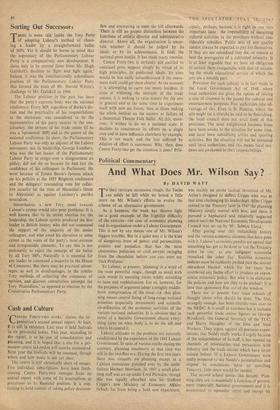Cash and Culture
‘C ENTRE FORTY-TWO works,' claims the or- ganisation's second annual report. At least, It is still in existence. Last year it held festivals in six provincial towns. This year, according to the report, is to be one of consolidation and planning, and it is hoped that a site for a per- manent centre in London will soon be announced. Next year the festivals will be resumed, though where and how many is not yet clear.
The centre is still chronically short of money. Few individual subscriptions have been forth- coming. Centre Forty-two emerges from its annual report with some of its assumptions as precarious as its financial position. It is con- tinuing its bold custom of taking policy decisions first and attempting to meet the bill afterwards. There is still no proper distinction between the functions of artistic director and administrative director. Above all, the organisation is uncer- tain whether it should be judged by its ideals or by its achievements. It finds the national press hostile. It has made many enemies.
Centre Forty-two is certainly not entitled to sustained press support simply by virtue of its high principles, its publicised ideals. Its aims would be less easily misunderstood if the move- ment itself could get them clearer. At the moment it is attempting to carry too many burdens. It aims at widening the interests of the trade unions; it is seeking to raise money for the arts in general and at the same time to experiment itself with new art forms, then at times staking the whole festival on the success or failure of a theoretical Theatre Folk Ballet. All this, more- over, it wishes to do on a national scale. It declines to concentrate its efforts on a single area and to have influence elsewhere by example. This is too much, and the loss suffered by dilution of effort is enormous. Why, then, does Centre Forty-two get the attention it does? Prin- cipally, perhaps, because it is right on one very important issue : the impossibility of sustaining cultural activities in the provinces without con- siderable subsidies. Public arts of any quality cannot always be expected to pay for themselves. If they are not subsidised they die, or remain at best the prerogative of a cultivated minority. It is at least arguable that we have an obligation to sustain them comparable with that of sustain- ing the whole educational service of which the arts are a notable part.
Provision for such subsidy is in fact made in the Local Government Act of 1948, where local authorities are given the option of raising a rate of sixpence in the pound for cultural and entertainment purposes. Few authorities take ad- vantage of this. Even in St. Pancras, where the arts might (at a stretch) be said to be flourishing, the local council does not avail itself of this prOvision. The most enlightened business firms have been awake to the situation for some time, and have been subsidising artists and sporting activities. But the situation will not be remedied until local authorities, and this means local resi- dents are awakened to their responsibilities.


































 Previous page
Previous page